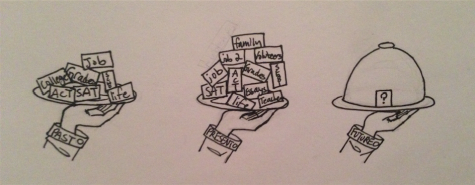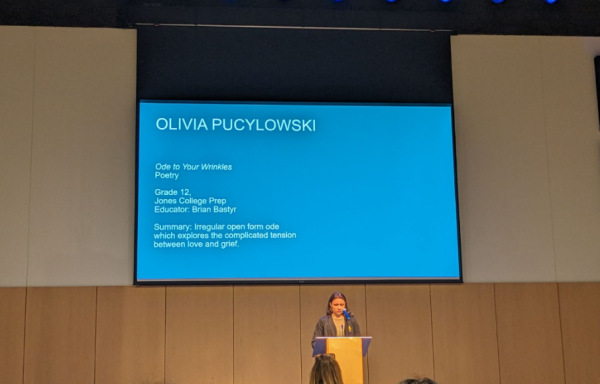Changing culture of High School
Different generation of students faces new and different challanges
School is constantly changing and adapting to match the requirements that help its students survive the present society they are in. Our grandparents’ generation is different to our parents; our parents’ generation is different to ours. It seems each generation is getting more difficult.
According to psychologist Jean Twenge’s, research on psychological issues found in teens, each passing generation has shown more mental health issues. She believes it is part of the changes in cultures that start to pile so much on each generation’s plate.
But how much change really has occurred? It seems that each generation has its similarities and differences when it comes to school and how each person felt about it.
Social science teacher Jim DuBois graduated in 1974 from North Central High School in Michigan. “The number one change is technology, it takes so much faster to advance, you have new phones coming out every six months now,” said Dubois.
DuBois also believes that the testing for the students has changed from when he was in school. DuBois says the he took the SATs and the MEAP (Michigan Educational Assessment Program). “Now it seems like [the students] are being tested to death, as compared,” said DuBois.
For DuBois, he did not have the testing pressure that the students do today. “Students are students, they haven’t changed,” he said, “but the demand from society of the students have.” He says the pressure in education in the 1970’s is a lot different than they are now.
Another difference that DuBois sees is the ways to get into college. “There was much less competition to get into college, for scholarships or grants”, he said, “as long as you had a reasonable score, you could get in.”
Unlike a lot of students at Jones, Dubois grew up on a farm. “I didn’t have a job in high school, my parents wouldn’t allow it,” said DuBois. He says he would get weekly allowances for helping out because school days were school days.
In Dubois’ own experience, he said that high school was one of the best four years his life.
Foreign language teacher, Danielle Wracker attended Wheeler High School in Valparaiso, Indiana and graduated in 1978.
“I went to a 7-12 [grade] high school, and it was very crowded,” said Wracker. She says her graduating class had 48 people and only 3 (including herself) went to college. “My school was not very academically centered,” said Wracker, “kids at Jones are more hardworking than I ever saw in my high school, and get better grades”.
When it came to testing and applying to colleges, Wracker said it was much different. “There weren’t any practice ACT tests, there were no books, so you were all on your own,” said Wracker, “when you walked in, you had no idea how the test was going to be like.” She also says that the ACT was only taken if the student planned to attend college; it wasn’t administered school wide like it is now.
As for the college application process, she didn’t get much help as well. “We had counselors, but they weren’t much help,” said Wracker. She says that she would fill everything and mail everything herself.
Wracker also had afterschool activities, like many students at Jones. “I had baby sitting, theatre practice (for the senior play) and piano lessons”, she said, “I didn’t have a job, it was hard at the time for high school students to have jobs in the area because there wasn’t much to do.”
When she babysat, she would start at seven or eight in the evening and end at between midnight and 2 a.m. She days that babysitting didn’t affect her schoolwork much since she was able to do work before and during her babysitting.
Between juggling schoolwork, piano and babysitting, she said things became overwhelming. “I felt like I had to make a decision on whether I would continue at piano and work harder at school and get a little worse grades or let piano drop,” she said, “I didn’t have time to practice so I eventually dropped it.”
Wracker said that her high school experience was full of work.
Social science teacher John Lund, who graduated from Grosse Pointe South in Grosse Pointe, Michigan in 2003, says that technology has been so different (compared to then and now). “ I got my first cellphone when I was junior, and all it did was call.” He says that he didn’t having texting and apps compared to the phones today, which helps people become more aware of their surroundings.
When it came to classes, Lund says his high school experience seemed pretty similar to today.
“I got everything hard out of the way, so that by senior year, I had a double lunch,” said Lund.
Like most students at Jones, Lund was apart of extracurricular activities and clubs that would take a lot of his time.
“My two big things were the newspaper and swimming”, said Lund, “ and sometimes they got in conflict with each other because they were both pretty demanding.”
Lund said that after school jobs were never an issue for him. “I lifeguarded, but that was only in the summer,” he said. The season started at the end of the school year and ended in the start of the next school year, so a job conflicting with academics was not a problem.
But for teens today, how much do they have on their plate compared to 40 years ago? Or even a little more than a decade ago?
For Isela Silvera ’16, she says that so far, high school had been pleasant but has taking for a turn. “This year had been pretty stressful because I went from taking no AP classes to having three of them.”
She says that she tailors her classes that will help her for college. “I recently decided that I want to go into a math major for college so next year I’m going to take AP math classes,” said Silvera.
As for afterschool, Silvera says she spends her time for Asian Club practice and Science Olympiad.
“I have practice for Asian Club until 4:30, and I wait and do homework until my mom picks me up at six. When I get home, I still have to finish homework,” said Silvera.
Another thing that takes up time is Science Olympiad. She says that she would study for her event once a week but when competition time was near, she would spend more time.
Silvera knew that junior year would be busy. “I’m taking AP Lang, AP, Spanish, and AP Psych, so I have a lot of homework from them. The classes aren’t that bad, I just spend a lot of time doing the homework,” said Silvera.
“High school had been rigorous course work and moderately stressful, but for the most part, it’s fun,” said Silvera.
“The after school activity that I always put first is being president of Green Team, and I’ve dedicated time apart from homework and applications to plan activities for the Green Team, which is a coalition of Jones students wishing to make our community more environmentally friendly, which adds to my already busy schedule,” said Sara Zaleta ’15. Aside from being apart of Green Team, she takes AP courses, plays sports, and takes part in other clubs.
She believes that her junior year was one of the most difficult years of high school. That year, she took 3 AP courses, ACT prep classes, Baile Folkorico (a club that Zaleta started which teaches students traditional Mexican dances), and swimming. “When I had swim meets, I would get home at 9 p.m.,” said Zaleta.
After she gets home, she says it would be time for her to start on her homework. She admitted that she would spend more time focusing on her AP classes.
“I think all my classes were equally as tough, but I wasn’t as much interest in the content,” Zaleta said.
For her senior year, it was time for Zaleta to apply for college and scholarships. She says she tried to start the applications early to save time; when that didn’t work out, she decided to figure out an efficient way for her do them all.
“I think I got most of [the college applications] done in short bursts of productivity”, she said, “ I would stay up all night every other week to writing essays, emailing reps, and researching colleges.”
When teens have a full plate of schoolwork, afterschool activities, and/or jobs, things can get a little hectic for them. This can lead to a big issue: stress.
According to the American Psychological Association, the most stressed out demographic are teens (based on their 2013 Stress in American Survey). The average teen just seems to get busier and busier, trying to keep up with the changing culture and way of life.
“The whole experience has been really stressful, said Zaleta, “I seriously think that my life expectancy has decreased by a few years because of all the stress I’ve put in.”








